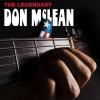Don Mclean(唐.麦克林)于1945年10月2日出生在纽约,是充满理想主义色彩的天秤座人。在他十几岁的时候,他就在纽约当地的民谣俱乐部里自弹自唱了。之后很长一段时间,他在一艘往来于美国东海岸各港口之间的帆船上继续他的弹唱生涯。在轮船上的这段时间里,他为自己是否要跟随前辈皮特西格而自我斗争着,这也是他小有建树的一段时间。之后,大约在1970年,也就是Don McLean25岁的时候,他在MediaArts旗下发表了他的首张个人专辑“Tampestry”(挂毯),此时他已经写了那首著名的“Vincent”,但并为在此张专辑中发表。这张专辑卖得很不好,市场反响寥寥,所以Don McLean继续在小学校等地方卖唱。在“Vincent”这首歌被许多唱片公司拒绝后,1971年Don McLean带着“American Pie”(美国派)这首歌卷土重来。主打同名曲“American Pie”是一首长达8分半钟的歌曲。歌曲浸透着浓重的民谣和流行味道,但却是一首哀歌,怀念的对象是英年早逝(23岁)的猫王同时代人物Buddy Holly。这首史诗一般的“American Pie”,为他带来了排行榜冠军和市场大卖。
在这之后,一切变得更加容易了。“Vincent”在商业上和艺术上都获得了极大成功。这首献给画家文森特凡高的歌曲无论是旋律还是歌词都十分动人,虽然在美学上是较为传统的一种,但若作者没有深厚的感情是写不出这样的歌曲来的。一时间,舆论都认为Don McLean和凡高有英雄惺惺相惜之感。作为无数人热血青春英雄的凡高,以他的性命去追求一生中最美和最极致的艺术。“Vincent”就是这样带着惋惜、缅怀和爱打动了人们。过后,Don McLean很快又成了公众焦点,因为另外一个歌手Roberta Flack写给他一首名字叫“Killing me softly with his song”(用他的歌声温柔地杀死我)的歌。伴随着这些歌曲的大卖,Don McLean的事业如日中天。
但Don McLean不愿自己成为一辈子只有两首歌的歌手。为了摆脱从前成功的阴影,他拒绝再创作任何类似于“美国派”的歌曲,而是努力尝试新类型的歌曲。其结果是可想而知的,伴随着销量的一落千丈,他的老东家United Artists一脚把他踢了开来。新东家看他的新作连榜也打不上去,很快又解约了。Don McLean过了好几年没有唱片公司可以发唱片的惨淡日子。在1980年,Don McLean终于咸鱼翻身,带着翻唱老前辈Roy Orbison的一曲“Crying”,终于上了Top 10。但终归他的时代已经过去了。在随后的不断演出和出现场唱片中,虽然他还在继续作新的音乐,但影响已日渐微薄。
Famed for -- and ultimately defined by -- his perennial "American Pie," singer/songwriter Don McLean was born October 2, 1945, in New Rochelle, NY. After getting his start in the folk clubs of New York City during the mid-'60s, McLean struggled for a number of years, building a small following through his work with Pete Seeger on the Clearwater, a sloop that sailed up and down the eastern seaboard to promote environmental causes.
Still, McLean was primarily singing in elementary schools and the like when in 1970 he wrote a musical tribute to painter Vincent Van Gogh; the project was roundly rejected by a number of labels, although MediaArts did offer him a contract to record a number of his other songs under the title Tapestry. The album fared poorly, but Perry Como earned a hit with a cover of the track "And I Love Her So," prompting United Artists to pick up McLean's contract. He returned in 1971 with American Pie; the title track, an elegiac eight-and-a-half-minute folk-pop epic inspired by the tragic death of Buddy Holly, became a number one hit, and the LP soon reached the top of the charts as well.
The follow-up, "Vincent," was also a smash, and McLean even became the subject of the Roberta Flack hit "Killing Me Softly With His Song"; however, to his credit -- and to his label's horror -- the singer refused to let the success of "American Pie" straitjacket his career. Subsequent records like 1972's self-titled effort and 1974's Playin' Favorites deliberately avoided any attempts to recreate the "American Pie" flavor; not surprisingly, his sales plummeted, and the latter release even failed to chart. After 1974's Homeless Brother and 1976's Solo, United Artists dropped McLean from his contract; he resurfaced on Arista the next year with Prime Time, but when it too fared poorly, he spent the next several years without a label.
McLean enjoyed a renaissance of sorts with 1980's Chain Lightning; his first Top 30 LP in close to a decade, it spawned a Top Ten smash with its cover of Roy Orbison's classic "Crying," and his originals "Castles in the Air" and "Since I Don't Have You" both also reached the Top 40. However, 1981's Believers failed to sustain the comeback, and after 1983's Dominion he was again left without benefit of label support. McLean spent the remainder of his career primarily on the road, grudglingly restoring "American Pie" to his set list and drawing inspiration from the country market; in addition to a number of live sets and re-recordings of old favorites, he also returned to the studio for projects like 1990's For the Memories (a collection of classic pop, country and jazz covers) and 1995's River of Love (an LP of original material).





